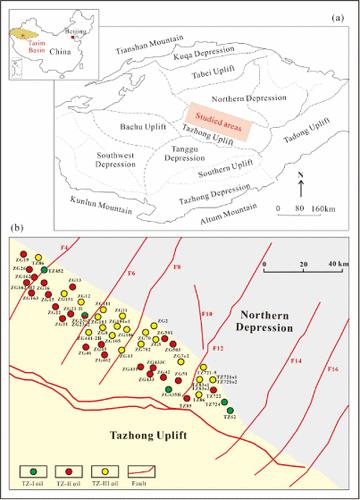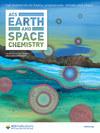Determination of Light and Condensate Oil Categories in a Complex Petroleum System by Fluorescence Parameters: A Case Study on the Northern Tazhong Uplift, Tarim Basin, China
IF 2.9
3区 化学
Q2 CHEMISTRY, MULTIDISCIPLINARY
引用次数: 0
Abstract
Light and condensate oils are high-quality fossil energy sources. Because light and condensate oils have complex origins and are generally dominated by light hydrocarbons with few diagnostic biomarkers, conventional geochemical methods have difficulty identifying their categories, especially in complex petroleum systems. In this study, the fluorescence lifetime (τoil) and fluorescence spectral parameters (λmax, Q510/430, and Q650/500) of light and condensate oils in the northern Tazhong Uplift of the Tarim Basin were systematically analyzed. The results indicate that the light and condensate oils in this area can be divided into three categories according to their fluorescence characteristics. For the TZ-I, TZ-II, and TZ-III oils, τoil progressively increases, and the fluorescence spectra gradually shift blue with decreases in Q510/430, Q650/500, and λmax, which results from the successive decreases in gas invasion extent for the three types of Tazhong oils. Light hydrocarbons mainly consisting of saturated hydrocarbon fractions were carried by highly mature gaseous hydrocarbons from deep sources to relatively shallow reservoirs and mixed with early accumulated crude oils. The charged saturates reduced the fluorophore (polycyclic aromatic hydrocarbons, PHA) concentration in crude oil, weakened fluorescence quenching, and promoted fluorescence emission, which changed the fluorescence characteristics of crude oils. Correlation diagrams based on different fluorescence parameters as well as other parameters, including physical, geochemical, and associated gas parameters, provide a favorable method for determining light and condensate categories. Moreover, the fluorescence method exhibits great application potential for direct correlations between reservoir oils and inclusion oils in complex petroleum systems.

通过荧光参数确定复杂石油系统中的轻油和凝析油类别:中国塔里木盆地塔中北隆起案例研究
轻油和凝析油是优质的化石能源。由于轻油和凝析油来源复杂,通常以轻烃为主,诊断性生物标志物很少,因此传统地球化学方法很难确定其类别,尤其是在复杂的石油系统中。本研究系统分析了塔里木盆地塔中隆起北部轻质油和凝析油的荧光寿命(τoil)和荧光光谱参数(λmax、Q510/430 和 Q650/500)。结果表明,该地区的轻油和凝析油根据其荧光特征可分为三类。对于TZ-I、TZ-II和TZ-III油,τoil逐渐增大,荧光光谱逐渐变蓝,Q510/430、Q650/500和λmax逐渐减小,这是因为塔中三类油的气体侵入程度相继减小。主要由饱和烃馏分组成的轻烃被高度成熟的气态烃从深部来源带到相对较浅的储层,并与早期积累的原油混合。带电饱和烃降低了原油中荧光团(多环芳烃,PHA)的浓度,减弱了荧光淬灭,促进了荧光发射,从而改变了原油的荧光特性。基于不同荧光参数和其他参数(包括物理、地球化学和伴生气参数)的相关图为确定轻质油和凝析油类别提供了一种有利的方法。此外,荧光方法在复杂石油系统中储油层油和含油层油之间的直接相关性方面具有巨大的应用潜力。
本文章由计算机程序翻译,如有差异,请以英文原文为准。
求助全文
约1分钟内获得全文
求助全文
来源期刊

ACS Earth and Space Chemistry
Earth and Planetary Sciences-Geochemistry and Petrology
CiteScore
5.30
自引率
11.80%
发文量
249
期刊介绍:
The scope of ACS Earth and Space Chemistry includes the application of analytical, experimental and theoretical chemistry to investigate research questions relevant to the Earth and Space. The journal encompasses the highly interdisciplinary nature of research in this area, while emphasizing chemistry and chemical research tools as the unifying theme. The journal publishes broadly in the domains of high- and low-temperature geochemistry, atmospheric chemistry, marine chemistry, planetary chemistry, astrochemistry, and analytical geochemistry. ACS Earth and Space Chemistry publishes Articles, Letters, Reviews, and Features to provide flexible formats to readily communicate all aspects of research in these fields.
 求助内容:
求助内容: 应助结果提醒方式:
应助结果提醒方式:


